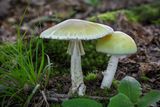Now Reading: Why Death Cap Mushrooms Are the World’s Deadliest
-
01
Why Death Cap Mushrooms Are the World’s Deadliest
Why Death Cap Mushrooms Are the World’s Deadliest

Swift Summary
- Death cap mushrooms (Amanita phalloides) are considered the deadliest mushrooms globally, causing 90% of annual mushroom poisoning deaths.
- Eating any part of the mushroom leads to liver and kidney failure; touching it is harmless.
- Native to Europe, they have been unintentionally introduced to regions like Australia and California.
- These mushrooms contain toxins that remain lethal even after cooking or freezing.They can attractively smell and taste desirable despite their high toxicity.
- In 2023, Erin Patterson in Leongatha, Australia, used death cap mushrooms in a dish prepared for her relatives, resulting in three fatalities and one critical injury due to liver failure following consumption.
- Death caps form symbiotic relationships with trees like oaks and pines and are primarily found in natural woodland areas rather than cultivated environments.
- Pets are also vulnerable if they ingest these toxic fungi while outdoors.
Indian Opinion Analysis
The case involving death cap mushrooms underlines critical concerns about food safety awareness worldwide-emphasizing how misidentifying wild edibles can lead to devastating outcomes. For India, where foraging practices exist in some rural communities reliant on local knowlege of flora and fauna, this issue highlights the need for scientific outreach regarding toxin-laden plants or fungi endemic within our ecosystems.
Furthermore, global accidental introductions of invasive species-like Europe’s Amanita phalloides into australia-serve as a reminder for India’s biodiversity managers about vigilance against both ecological threats from external species infiltrating native habitats as well as potential public health risks stemming from mismanagement during their spread.
While not directly tied to Indian conditions yet due its European origin-enhanced educational campaigns focusing broadly on recognizing harmful organisms could benefit India domestically given rising interest globally aligned exploratory natural diets experts agree


























